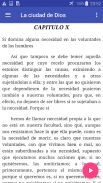






La ciudad de Dios (Agustín de Hipona) V. de prueba

Description of La ciudad de Dios (Agustín de Hipona) V. de prueba
La ciudad de Dios, cuyo título original en latín es De civitate Dei contra paganos, es decir, La ciudad de Dios contra los paganos, es una obra escrita en 22 libros de Agustín de Hipona que fue realizada durante su vejez y a lo largo de quince años, entre 412 y 426. Es una apología del cristianismo, en la que se confronta la Ciudad celestial a la Ciudad pagana. Las numerosas digresiones permiten al autor tratar temas de muy diversa índole, como la naturaleza de Dios, el martirio, el origen y la sustancialidad del bien y del mal, el pecado y la culpa, la muerte, el derecho y la ley, la contingencia y la necesidad, el tiempo y el espacio, la providencia, el destino y la historia, entre otros muchos temas.
Agustín de Hipona, conocido también como san Agustín (354 - 430), es un santo, padre y doctor de la Iglesia católica.
El «Doctor de la Gracia» fue el máximo pensador del cristianismo del primer milenio. Autor prolífico, dedicó gran parte de su vida a escribir sobre filosofía y teología, siendo Confesiones y La ciudad de Dios sus obras más destacadas.
The city of God, whose original title in Latin is De civitate Dei against pagans, that is, the city of God against the pagans, is a work written in 22 books by Augustine of Hippo that was made during his old age and throughout fifteen years, between 412 and 426. It is an apology of Christianity, in which the heavenly city is confronted with the pagan city. The numerous digressions allow the author to deal with topics of very diverse nature, such as the nature of God, martyrdom, the origin and substantiality of good and evil, sin and guilt, death, law and law, contingency and necessity, time and space, providence, destiny and history, among many other topics.
Augustine of Hippo, also known as St. Augustine (354-430), is a saint, father and doctor of the Catholic Church.
The "Doctor of Grace" was the greatest thinker of Christianity of the first millennium. Prolific author, he devoted much of his life to writing about philosophy and theology, with Confessions and The City of God his most outstanding works.

























